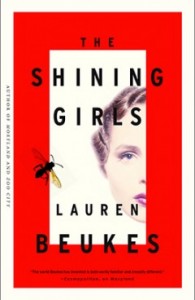“The Shining Girls” by Lauren Beukes

The Shining Girls by Lauren Beukes was the October selection for one of my growing number of book groups (six and counting…), Books and Bars.
How’s this for a hook: A time-traveling serial killer visits Chicago over the decades, targeting strong, smart women. I found it a devourable book, and gulped its 375 pages down in about 24 hours.
The book jumps around in time and perspective, including characters Kirby, “the one who got away”, Harper the killer, Dan the journalist, Harper’s many victims, a very creepy house, a drug addict, and even Chicago itself. Beukes is from South Africa, but the Chicago setting is thoroughly and engagingly done.
What I loved about the book were the portraits of the complex, amazing women, and this made it all the more wrenching when Harper took them down.
By contrast, Beukes chose to make Harper non-complex, and I appreciated her efforts to make the killer non-fascinating and less dimensional than his victims. Mysteries that inadvertently glorify and romanticize serial killers are sadly frequent. In fact, almost all the male characters in the novel (save for an amazing male dog) are pale shadows compared to the female characters.
The violence in the book is extensive and graphic. Whether it was gratuitously graphic was a key point in my group’s discussion of the book. Does graphic violence automatically glorify or fetishize it? The author states in her afterward that she was writing in part as a reaction to the violent death of a woman friend, and so the in-your-face presentation was a deliberate provocation to see the ugly truth that exists in the world.
A protest I had before the discussion was that only two of the women were able to defy Harper and fight back. I wanted ALL the women to have the opportunity. Another woman at the Books and Bars discussion noted that fighting back isn’t always a choice, and isn’t always in the victims best interesting in surviving. I was abashed to need to be reminded of this so soon after finishing Patricia Weaver Francisco’s Telling: A Memoir of Rape and Recovery.
I was ambivalent (i.e. pulled in both directions) about the time travel in the book. Time travel is hard to pull off, fraught with inconsistency, and in this case, depressing in its fated-ness. Beukes had friends of hers make a chart about different types of time travel.
What definitely didn’t work for me was the relationship between Dan and Kirby. It felt creepy and weird in a way that I’m not sure was intended.
Reaction from friends differed widely. Some hated it, some liked, some loved it. I thought it was enjoyable as a reading experience, but not without its troubling aspects.